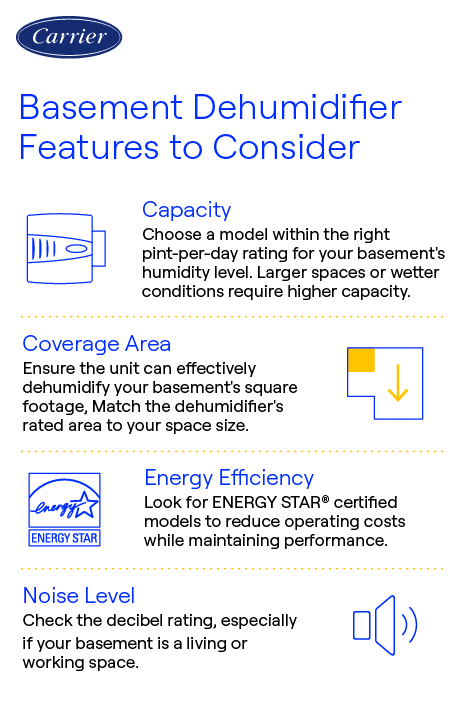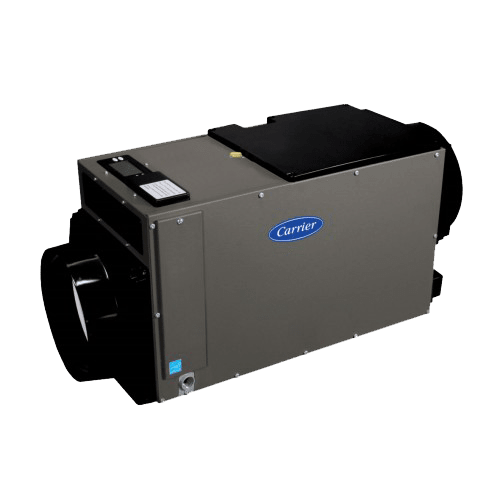Finding The Best Dehumidifier For Your Basement In 2026
If you have a basement, you understand the importance of maintaining optimal humidity levels. Excess moisture can lead to mold growth, musty odors, and even structural damage. Investing in the best dehumidifier for basement conditions is essential for preventing these issues.
In this article, we will discuss why a basement dehumidifier is necessary, key features to look for when selecting one, installation and maintenance tips, and additional features that enhance basement comfort. We'll also explain why Carrier dehumidifiers are the ideal choice for controlling basement humidity.

Why You Need a Dehumidifier in Your Basement
- It maintains a comfortable environment by reducing the sticky, clammy feeling caused by excess moisture.
- It can also lower heating and cooling costs by making your air conditioning system more efficient. When air is less humid, it feels cooler, allowing you to set your thermostat higher without sacrificing comfort.
- A dehumidifier helps prevent the growth of dust mites, common allergens that thrive in humid conditions.

Key Basement Dehumidifier Features to Consider

- Capacity and coverage area are crucial. A dehumidifier with a larger capacity removes more moisture, making it suitable for larger basements. Consider the dehumidifier's coverage area to ensure it effectively treats the entire space.
- Energy efficiency is another important aspect. Look for ENERGY STAR® certified dehumidifiers, as they consume less energy without compromising performance. Selecting the most efficient dehumidifier for basement use saves on electricity costs and minimizes your environmental impact.
- Noise levels and quiet operation are essential, especially if your basement is a frequently used living or working space. Choose a dehumidifier that operates quietly to maintain a peaceful environment without disruptive noises.

Choosing the Best Dehumidifier for Your Basement
- Determining the size and capacity you need: Measure your basement's square footage to determine the appropriate dehumidifier capacity. As a general guideline, a 30-pint dehumidifier is suitable for small basements up to 1,500 square feet, while larger basements may require a 50-pint or 70-pint unit.
- Moisture removal daily rate: The moisture removal daily rate is the amount of moisture a dehumidifier can pull from the air over 24-hours. This metric signifies the efficiency of a dehumidifier.
- Filtration efficiency: MERV rating measures the effectiveness of air filters in capturing particles from the air. Carrier dehumidifiers come with a MERV 8 filter.

Additional Features to Enhance Dehumidifier For Basement Comfort
Carrier Dehumidifiers: Your Best Choice
Connect With A Carrier Dealer For The Best Dehumidifier For Your Basement
Frequently Asked Questions About Best Dehumidifier For Basement
Explore Carrier Dehumidifiers For Basements
Choose a Carrier dehumidifier for effective moisture control and a more comfortable basement Designed to remove excess humidity, Carrier dehumidifiers help prevent mold, mildew, and musty odors, while improving indoor air quality. They operate quietly and efficiently, making them ideal for basements and any area prone to moisture. With durable construction and energy-efficient features, a Carrier dehumidifier ensures a healthier, more comfortable environment by maintaining optimal humidity levels year-round.
Removes unwanted indoor humidity to keep you comfortable. Recognized as the Most Efficient of ENERGY STAR® 2024. Remove up to 100 pints of airborne moisture per day for enhanced comfort and healthier home air.
Learn More About Dehumidifiers For Basements
- What are dehumidifiers & what do they do?
- Whole-home dehumidifier pros & cons
- Selecting the best dehumidifier for your home
- Breathe easier with better indoor air quality at home
- Understand the difference between a humidifier vs dehumidifier
- Discover what humidity should be house be at?



